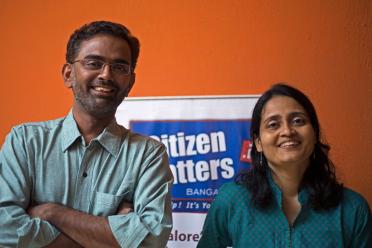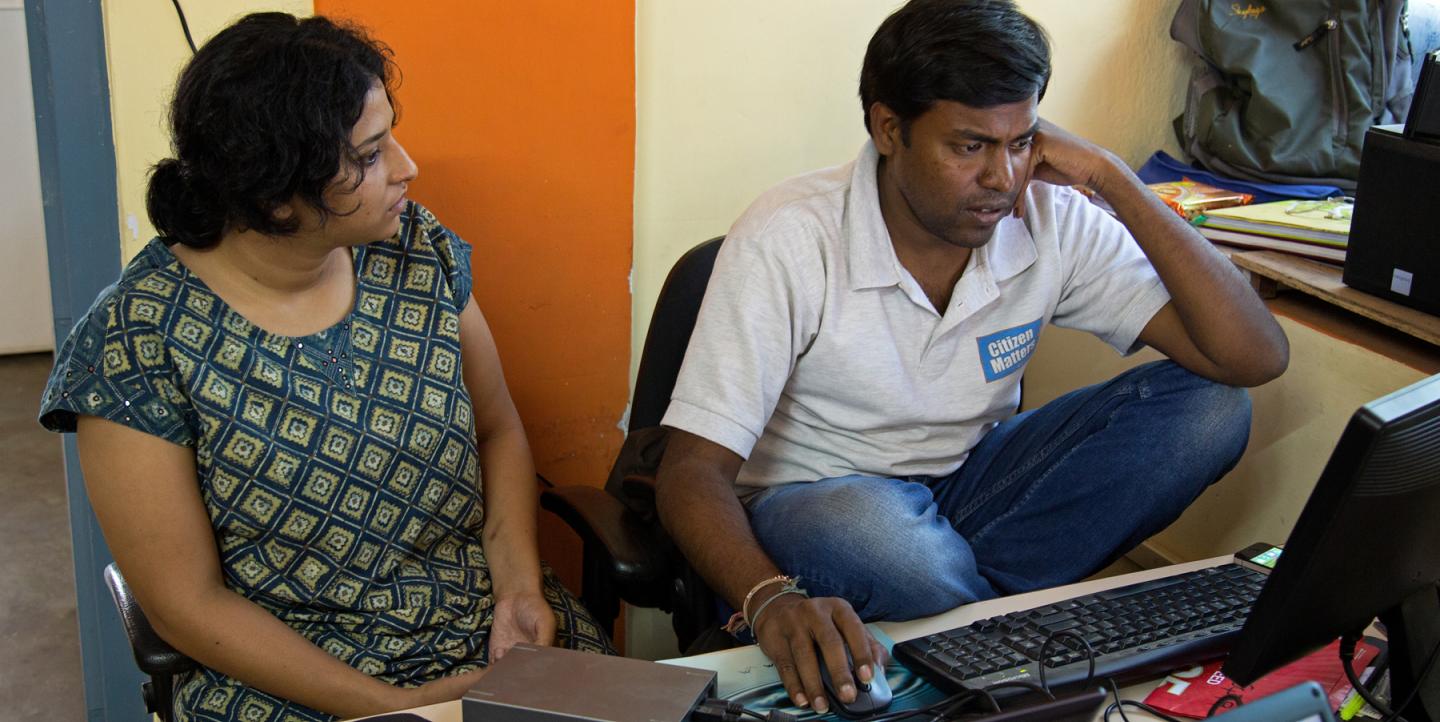When Bangalore residents Subramaniam Vincent and Meera Krishnamoorthy looked around their booming city in 2007, true local news in English was nowhere to be found.
Newspapers and online media in the city heavily covered Indian politics and issues on a national scale but lacked reports on stories that directly affected their readers.
With Bangalore facing a large population spike in the early 2000s, Krishnamoorthy looked to the news to stay in tune with her growing community but couldn’t find much relevant information.
“[Bangalore] jumped up so quickly,” she said. “It was fast and a little bit out of control. As a result, things were messy. The traffic was terrible, and there were so many [civic] projects that had gotten started but were moving along slowly. There were a lot of things not working…I wanted to understand why.”
This problem prompted Vincent and Krishnamoorthy to launch Citizen Matters, a local news site focusing on Bangalorean news from the citizens’ points of view.
As an online news outlet, Citizen Matters met with local community members and let them air their complaints. They asked community members to take pictures of the pothole or debris dumping they came across, and to describe what they did about it and how the government responded to the issue.
“We were able to convert those grievances into citizen stories,” Krishnamoorthy explained.
The lingering question for Vincent and Krishnamoorthy, though, was how their local news site could be sustainable. Here, the journalists and business partners share the life cycle of their project with IJNet.
Find an audience who are your eyes and ears
Both Citizen Matters and the city of Bangalore have undergone plenty of changes since the publication launched seven years ago.
Bangalore’s population rose from approximately 5 million in 2001 to more than 8.5 million today, and the city is a buzzing tech hub in India. But as the city changed, civic issues began to pop up left and right.
When Citizen Matters started, few other news outlets covered these problems until one issue gained momentum – road-widening. When residents began to see markers on their homes – 3, 5 or 10 meters – Citizen Matters looked into the issue, only to find that the government planned on widening roads to improve the traffic flow in Bangalore — but no one had asked the property owners. The government responded and said property owners would receive transferrable development rights.
People began asking questions: What are transferrable development rights and am I receiving adequate compensation through those rights? What will they do if traffic remains terrible even after the road-widening?
The issue slowly gained traction in different localities and once the daily newspapers began covering it, it became a major topic, Krishnamoorthy said.
Though Citizen Matters’ reporting staff worked on those stories, the website also published commentary and photos from locals, which it continues to do today.
Between one-fourth and one-third of the website’s content comes from citizens. Each piece is edited and sent back to the citizen journalist before getting published, and people now look to the publication for local voices.
Find the right business model
Vincent and Krishnamoorthy created Citizen Matters' publishing company, Oorvani Media, in 2007. Though Oorvani Media still owns Citizen Matters and houses other projects, the business partners switched up their business model for the local news site in particular, from a for-profit to nonprofit model.
They founded the Oorvani Foundation — oorvani means "city voice" — in August 2013 to fund Citizen Matters through grants and donations.
The decision to start a nonprofit came after years of relying mainly on advertising dollars from the website, which currently averages about 130,000 unique views per month, and selling the now-defunct print edition of Citizen Matters that ran from 2009 to 2012.
“We founded a foundation because we anticipated that raising money for the business side of Citizen Matters would only get harder because of the online environment for this kind of journalism,” Vincent explained.
Before focusing on raising money through the foundation only, they tried selling physical guidebooks on navigating Bangalore as a resident. While these were successful, the duo’s idea to sell the guides as e-books as well didn’t pan out as venture capitalists told Vincent the e-book market wasn’t strong enough yet in the region.
Through the foundation, people can donate to support Citizen Matters. Vincent said the most popular contributions are US$50 and US$100.
The foundation also relies on larger grants to support the costs of reporting and editing. Well-known philanthropist — and former journalist — Rohini Nilekani gave grant money last year, and Daksh supported Citizen Matters' 2014 election coverage.
Train your reporters
The full-time staff at Citizen Matters usually consists of an associate editor, two or three staff reporters and the co-founders.
When it first launched its citizen platform, the news outlet held a training on the basics of journalism. Forty-five people showed up.
On top of building up citizen reporters, the team continues to work with more experienced freelancers, typically veteran journalists who are in between jobs or work at other publications full time.
After building a reputation on investigative and civic reporting, experienced freelancers flocked in Citizen Matters’ direction, Vincent said.
Vincent also noted that Citizen Matters has a track record of “hiring youngsters who go out and expose major stories.”
“As long as these youngsters have the capacity and the skill, we teach them the context of the city,” he said.
Main image of Citizen Matters reporters Gangamma Madappa (left) and Akshatha M. Secondary image of Citizen Matters co-founders Subramaniam Vincent (left) and Meera Krishnamoorthy. Both images are courtesy of Citizen Matters.

